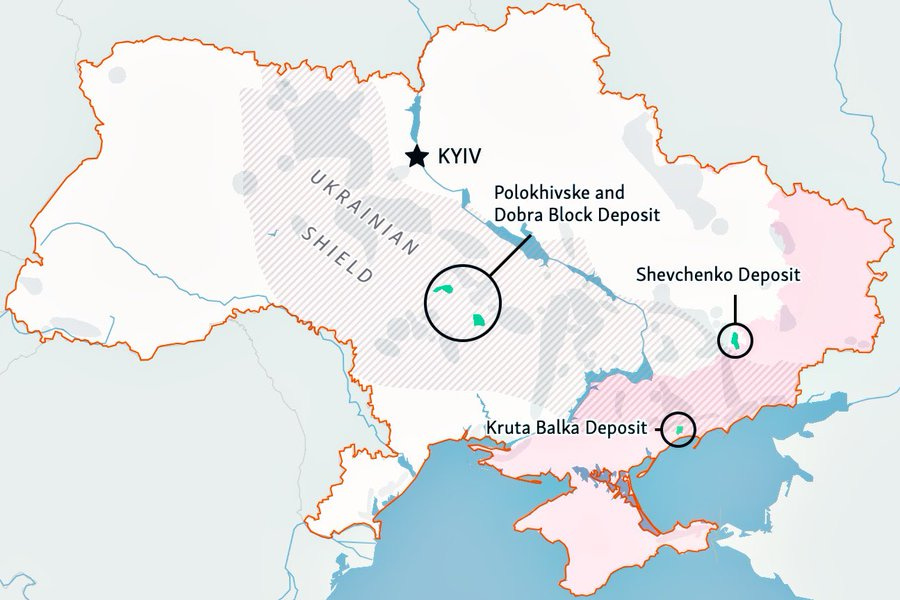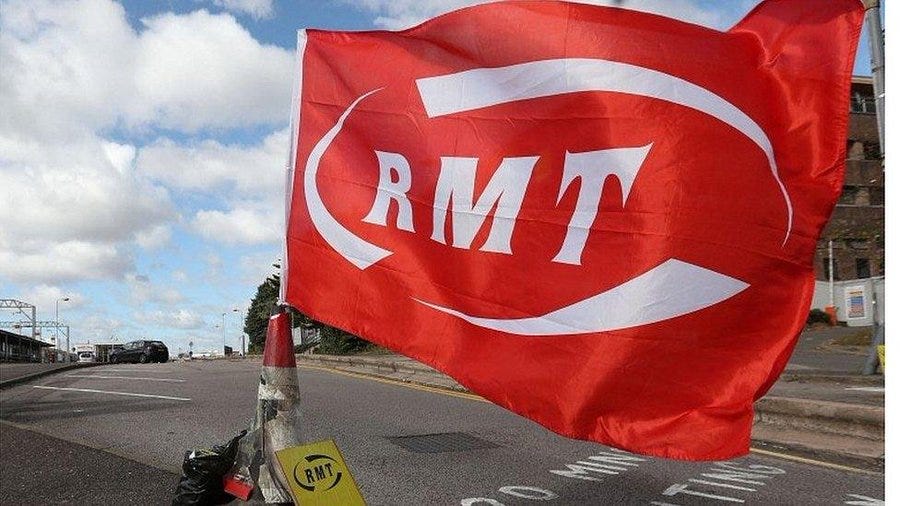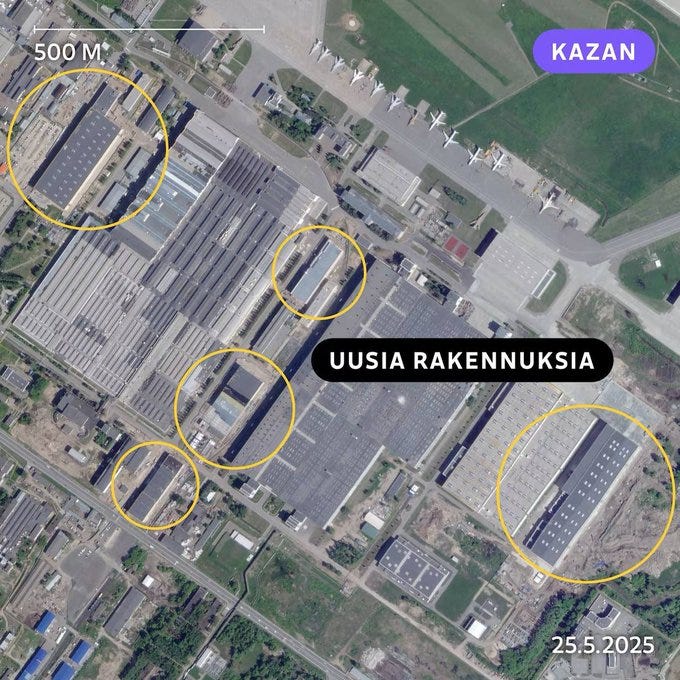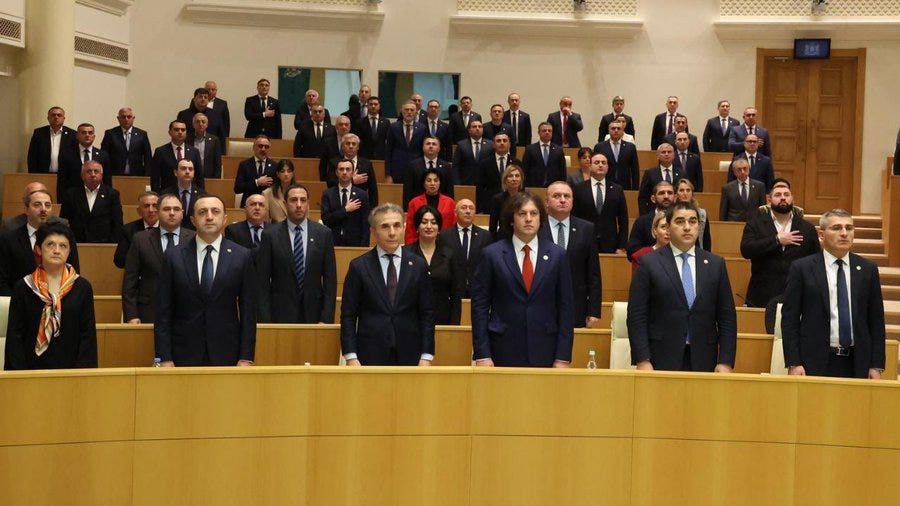Catching up…
For a general view of news from various geopolitical threatres, Scott’s EA Worldview is always superb.
Let’s get going…
Stories we’re following…
June 28: Overnight, Ukrainian air defenses shot down 22 out of 23 Shahed-type drones launched by Russia, primarily targeting Odesa from the directions of Primorsko-Akhtarsk and occupied Crimea. 21 were destroyed by firepower, 1 jammed by EW. One strike was recorded in Odesa; debris fell in 8 locations.
Ukraine downs new Russian Grom-1 bomb missile near Dnipro city, official says. To date, neither Russian guided aerial bombs nor the Grom-1 bomb missile had previously reached the city of Dnipro.
Russian missile strike on Dnipropetrovsk Oblast city kills 5, injures 25. Governor Serhii Lysak said most of the injured were hospitalized.
A Russian strike slammed into a 21-story apartment building in Odesa, setting the 7th to 9th floors on fire. Some people were trapped inside their homes. Emergency crews managed to rescue five people, including a little kid. Sadly, at least two people were killed and four others injured, according to early reports.
At least 2 killed, 13 wounded in Russian attacks across Ukraine over past day. According to Ukraine's Air Force, Ukrainian air defense intercepted 365 of 371 incoming Russian air weapons, including 363 Shahed-type drones, two Kinzhal hypersonic missiles, and six Kalibr cruise missiles.
Russian attack on key energy facility plunges parts of southern Ukraine 'into darkness,' governor says. "Russia decided to plunge Kherson Oblast into darkness," Governor Oleksandr Prokudin wrote on Telegram. He said the attack has disrupted electricity supply to multiple settlements.
Combat Situation
ISW: Open-source data suggests that Russia is increasingly investing in its defense industry and expanding its drone, infantry fighting vehicles (IFVs), and aircraft production and shipbuilding capabilities – several of the key platforms that Russia would likely rely on in a future war with NATO.
Russia's ongoing efforts to expand drone production are having a more immediate impact on the frontline in Ukraine, although Russia will continue to benefit from enhanced drone production capabilities during any future conflict.
Russian forces continue to implement tactical innovations that correspond with technological weapons system advancements.
Russia continues to use chemical weapons against Ukrainian forces and civilians in direct violation of the Chemical Weapons Convention (CWC), of which Russia is a signatory.
Ukrainian forces advanced near Lyman. Russian forces advanced in western Zaporizhia Oblast and near Kupyansk, Toretsk, and Pokrovsk.
Noel Reports: “The Sumy front looks a lot more stable now. My sources there say Russian comms are full of complaints, their guys across the border are totally exhausted. Also, the 225th Assault Regiment is pulling off some risky but super effective ops, really wearing down Russians.”
Huge fire at Kirovske airbase in occupied Crimea — still burning hours after the reported SBU drone strike during which Russian helicopters were reportedly destroyed
Clashes ongoing in eastern Ukrainian village near lithium deposits, as military rejects claims of Russian capture. Active fighting is still taking place around the village of Shevchenko in Donetsk Oblast, home to one of Ukraine's largest lithium deposits, a spokesperson for Ukraine's Khortytsia group of forces told the Kyiv Independent on June 27, denying reports Russia had occupied the village.
Ukrainian military intelligence “congratulated” Russian forces in Bryansk on Ukraine’s Constitution Day with a drone strike targeting the 120th GRAU arsenal early today. Locals reported explosions and gunfire, while authorities remain silent and banned filming of “air defense activity.”
Ukraine’s Security Service (SBU) struck a Russian airfield in occupied Crimea overnight (June 27–28), destroying a Pantsir-S1 air defense system and three helicopters (Mi-8, Mi-26, and Mi-28) at the Kirovske airbase — Ukraine's SBU reports.
Behind the Lines
Ukraine to seek EU sanctions against Bangladesh over Russia-stolen grain import. "It's a crime," Ukraine's ambassador to India, Oleksandr Polishchuk, told Reuters. "We will share our investigation with our European Union colleagues, and we will kindly ask them to take the appropriate measures."
Turkish FM Fidan has announced that he held talks with both Russian and Ukrainian delegations. “There is willingness for a third round of negotiations, and Turkey is ready to host them,” he stated.
North Korea deployed 20% of Kim's elite 'personal reserve' to fight against Ukraine in Russia, Umerov says. "These are soldiers specially selected based on physical, psychological, and other criteria," Defense Minister Rustem Umerov said. "These units have already suffered significant losses."
Chinese journalist injured by drone strike in Kursk Oblast, Russian governor says. According to acting Kursk Oblast governor Alexander Khinshtein, 63-year-old reporter Lu Yuguang from the Chinese television network Phoenix TV was wounded in a Ukrainian drone strike on the village of Korenevo.
German fighter jets were scrambled to intercept a Russian Il-20 reconnaissance aircraft over the Baltic Sea near NATO airspace on the morning of June 27, the German tabloid Bild reported.
The incident adds to a series of aerial provocations reported by NATO allies since the start of Russia's full-scale invasion of Ukraine in 2022 as Moscow is suspected of using the aircraft to spy on the alliance's positions.
The Russian Il-20M, which took off from Kaliningrad with its transponder switched off, was headed west toward international airspace near Poland and Germany when it was detected by NATO radar systems.
NATO alerted the German Armed Forces’ Quick Reaction Team (QRT), prompting the launch of two Eurofighter jets to intercept the aircraft.
Jimmy Rushton: “It turns out a key figure behind “Palestine Action” is James "Fergie" Chambers, a wealthy American communist and outspoken supporter of Russia’s invasion of Ukraine. Chambers has spent time in occupied Ukraine and no doubt had extensive contacts with Russian intelligence.”
Paul Mason: “Thanks to one person, the UK's biggest rail union just voted to sabotage British military aid to Ukraine - like blocking arms to the international brigades in the Spanish Civil War! A minority if blowhard tankies are doing Putin's dirty work in the labour movement.”
Reuters: Russia has resorted to using untrained spies after its diplomats and operatives were expelled from Europe in response to the full-scale invasion of Ukraine in 2022. The case against a Canadian teenager now jailed in Poland reveals how Moscow conducts the operations, and how cryptocurrency funds them.
It was May 2024, and he was in Copenhagen, running out of money after leaving Moscow a week earlier. He’d booked the cheapest room he could find in the Danish capital, but the hostel was still more expensive than he’d expected.
The teen, Laken Pavan, opened Telegram to type out a message to his handler in Russia’s Federal Security Service, which runs the country’s spy operations and is known by its acronym FSB.
“Are you able to send BTC today?” Pavan wrote to the man, using the shorthand for bitcoin. Pavan knew the man only as “Slon,” or elephant in Russian. The man had been assigned to the 17-year-old by FSB officers who had recruited the teen just weeks prior in Russian-occupied Donetsk, according to court documents reviewed by Reuters.
“I have a big problem there are no Bitcoin ATMs in Denmark,” Pavan explained in English. He’d checked around and it would be simpler in Poland, Pavan told his handler. Things were cheaper and he could more easily turn cryptocurrency into cash there.
“Check, I’ve sent you the first batch of money,” Slon replied. A minute earlier, Pavan’s bitcoin wallet showed it had received about $130 worth of the cryptocurrency.
Pavan soon responded with a photo of his boarding pass for a flight to Warsaw.
A couple days later, intoxicated and suddenly fearful, Pavan asked the receptionist of his budget hotel in Warsaw to call the police. Once officers arrived, he confessed to working with the FSB and planning to pass information about the Polish military to his Russian handler, the court documents show.

The Canadian pleaded guilty to charges of helping Russian intelligence and was sentenced in December 2024. Pavan, who turned 18 a few weeks after his arrest, is now serving a 20-month sentence in a Polish prison on the outskirts of Radom, a city 100 kilometres south of the capital.
Meanwhile in Russia & China…
The claim—Despite escalating war plans, Putin claims Russia will cut military spending starting in 2026. Russian President Vladimir Putin claimed on June 27 that Moscow plans to cut its military expenditure beginning next year, in a rebuke of NATO members' plans to increase defense spending to 5% of GDP.
Russia is expanding its aircraft plant in Kazan, where it produces bombers, according to Yle. Analysts report that several new buildings have appeared on the site, with a total area roughly equal to three football fields. The expansion is expected to be completed by the end of next year, with around €1 billion invested in the plant’s modernization. Yle notes that the Kazan aircraft plant is the only facility in Russia capable of replacing lost strategic bombers.
Georgia: Legislative changes restricting media access to courts and amending the Law on Freedom of Speech and Expression have been officially enacted today.
New legislative amendments in Georgia impose restrictions on media access to courts and revise the Law on Freedom of Speech and Expression. The changes prohibit filming inside courtrooms, courtyards, and corridors, with the authority to cover court proceedings now assigned to the court or its designated representative.
Additionally, the ruling Georgian Dream party has amended the Law on Freedom of Speech and Expression, refining the definition of defamation. The revised law defines defamation as a statement containing substantially false facts that damages an individual's reputation.
Previously, the law described defamation as a statement with substantially false facts that causes harm and tarnishes a person’s reputation, mirroring the spirit of the first amendment to the US constitution.
The updated law applies to insults made in both private and public settings. Furthermore, the amendment shifts the burden of proof in defamation lawsuits, requiring defendants to substantiate their claims in court.
In Europe…
EU reportedly fails to adopt new Russia sanctions due to Hungarian, Slovak opposition. Unlike Ukraine-skeptic Hungarian Prime Minister Viktor Orban, Slovakia has not previously attempted to block EU sanctions.
Polish President Andrzej Duda arrived in Kyiv for his final visit to Ukraine while in office. He will join celebrations for Ukraine’s Constitution Day and meet with President Zelensky, according to Ukraine’s Foreign Ministry.
Polish president-elect Nawrocki has said he is committed to keep helping Ukraine’s defences against Russia’s invasion, but has signalled a possible shift in Warsaw’s position by opposing Kyiv joining Western alliances such as Nato.
“Please be patient,” Duda told reporters at a press conference with president Zelensky. “The world looks different from behind the presidential desk, slightly different from what it looks like to a candidate in elections.”
Le Monde: Drug trafficking: from “ubershit” to “uberkill,” police and justice systems are alarmed by the growing involvement of minors
Minors, the small hands of drug networks, lookouts, suppliers, sellers, grouped under the name of "jobbers", or more recently recruited as "shooters", hitmen for hire who murder without qualms for a few thousand euros, are a crucial issue in the fight against drug trafficking.
"The context is alarming, the hold of drug trafficking on young people has never been so strong", believes Caroline Nisand, director of the Judicial Protection of Youth (PJJ) who, on Friday June 20 in Marseille, invited police officers, magistrates, educators, and youth specialists to reflect on possible strategies to "free minors from the grip of drug trafficking networks" .
The reality is unanimously described as dizzying. "Not a month goes by without the teams of educators being confronted with the death of a young person being monitored by the PJJ in circumstances that no society can accept," lamented Sonia Pallin, South-East Interregional Director. In Bouches-du-Rhône, between 2015 and 2024, the number of minors implicated each year in a drug case increased from 231 to 1,234 (+430%), and the number of those involved in murder or attempted murder increased from 7 to 23 (+228%).
UK launched huge operation to find suspected Russian double agent in MI6. Exclusive: Operation WEDLOCK lasted up to 20 years and took MI5 teams across world amid panic about ‘another Philby’
The extensive hunt for the alleged mole, called Operation Wedlock, was run by MI6’s sister agency, MI5, which deployed a team of up to 35 surveillance, planning and desk officers, who travelled across the world for 20 years.
One trip took an entire surveillance team to the Middle East for more than a week, the Guardian has been told, where the officers were put up in a CIA safe house. This trip was particularly hazardous, it’s understood, because the officers travelled to the country without the knowledge of its government, and would have been illegal under international law.
The tipoff about the alleged spy came from the CIA in the US, which was convinced a British intelligence official who was working in London had been relaying secrets to Russia.
The Guardian has discovered that the UK identified the alleged spy and a team of MI5 specialists was tasked with following him. The team did not operate from MI5 headquarters at Thames House in Westminster.
The man being surveilled was not thought to be working alone, a source said. Two other people, also based in London, were thought to be helping him. The source said Wedlock was a “highly unusual operation … the longest in recent memory and probably the most expensive”.
7sur7: Pro-Palestinian activists broke into the offices of OIP Land Systems in Tournai on Monday.
Dressed in white jumpsuits and with their faces covered, some 150 activists entered the Tournai-based company's warehouses early in the morning. Their action was part of the "Stop Arming Israel" campaign, through which they are demanding respect for the military embargo against Israel and the adoption of sanctions by Belgium against the Hebrew state.
People entered the warehouse with angle grinders and hammers, Freddy Versluys reported. “They ransacked our offices, destroyed computers, and then headed to the workshops, where they severely damaged several vehicles. They went on a rampage with spray paint and hammers.”
“Next delivery to Ukraine delayed”
The damage is estimated at around one million euros. OIP specializes in the maintenance, repair, and modernization of military vehicles. Since the Russian invasion, the company has already delivered around 260 armored vehicles to the Ukrainian army. “The next delivery is now delayed by at least a month. That's all these Hamas sympathizers will have achieved with their actions,” the CEO stated. Freddy Versluys also announced his intention to file a complaint against unknown parties.
The activists targeted OIP because the company belongs to the Elbit Systems group, a major Israeli arms company. According to the activists, Elbit supplies 85% of the drones and most of the ground military equipment used by the IDF. However, the Belgian CEO emphasizes that OIP operates completely autonomously and has not produced defense systems for Israel in twenty years.
Officers from the Tournai police zone provided support for the activists. The Tournai police officers were supported by colleagues from the Borinage region, notably those equipped with riot control vehicles. A federal police helicopter also arrived as reinforcements and flew over the activists. Some, who had fled to neighboring villages, were pursued by law enforcement. According to Stop Arming Israel, at least thirty people were arrested.
In other news…
The Globe and Mail: Ottawa orders Chinese company Hikvision to shut down operations over national security concerns
The Canadian government has ordered Chinese video surveillance and telecommunications equipment maker Hikvision to cease all operations in the country over national security concerns, Industry Minister Melanie Joly said on Friday.
“The government has determined that Hikvision Canada Inc’s continued operations in Canada would be injurious to Canada’s national security,” Joly said on X, adding that the decision was taken after a multi-step review of information provided by Canada’s security and intelligence community.
Hikvision, also known as Hangzhou Hikvision Digital Technology Co, has faced numerous sanctions and restrictions by Canada’s neighbour, the United States, over the past five and a half years for the firm’s dealings and the use of its equipment in China’s Xinjiang region, where rights groups have documented abuses against the Uyghur population and other Muslim communities.
Iranian authorities are refusing to grant IAEA Director General Rafael Grossi access to the country's nuclear facilities and are prohibiting the agency from conducting video surveillance there. This was stated by Iranian Parliament Vice Speaker Hamid-Reza Haji Babaei, Mehr reports . According to the politician, the decision is due to the fact that documents allegedly received from Israeli authorities contain detailed information about the state of Iran's nuclear infrastructure.
Nikkei Asia: Trump envisions China trip with dozens of CEOs
U.S. officials are drawing up plans for President Donald Trump to visit China later this year with a delegation of dozens of CEOs, Nikkei Asia has learned.
Such a visit is expected to resemble the president's trip to the Middle East in May. More than 30 business leaders accompanied him to Saudi Arabia, producing over $2 trillion in deals.
The chief executives on the Saudi trip included Tesla's Elon Musk, Blackstone's Stephen Schwarzman, BlackRock's Larry Fink, OpenAI's Sam Altman, Nvidia's Jensen Huang, Alex Karp of Palantir Technologies and Amazon's Andy Jassy.
The preparations follow Trump's announcement Thursday that a trade deal has been signed with China, without elaborating on the details.
On Friday, a spokesperson for China's Commerce Ministry said in a statement that Beijing and Washington had reached a "supplementary understanding" on China's rare-earth exports and U.S. export restrictions on China.
"China will, in accordance with the law, review and approve eligible export applications for controlled items," the spokesperson said in reference to rare-earth elements.
"In turn, the United States will lift a series of restrictive measures it had imposed on China," the spokesperson continued, likely pointing to export controls on semiconductors and artificial intelligence imposed during the Biden administration.











